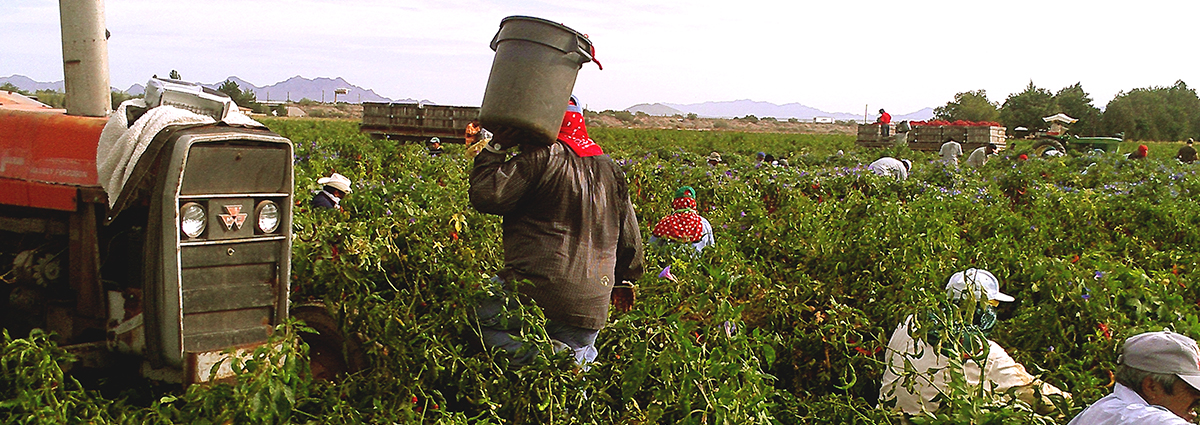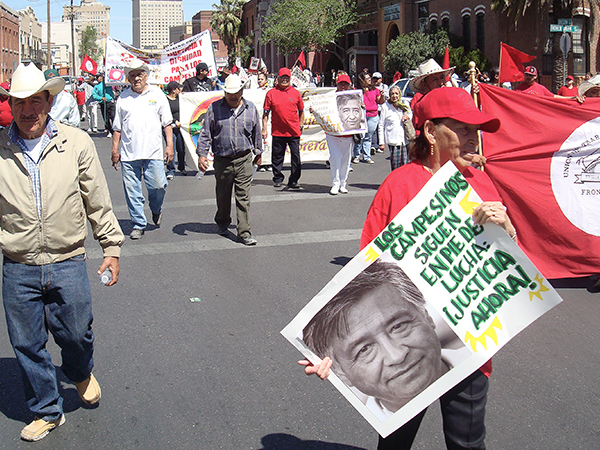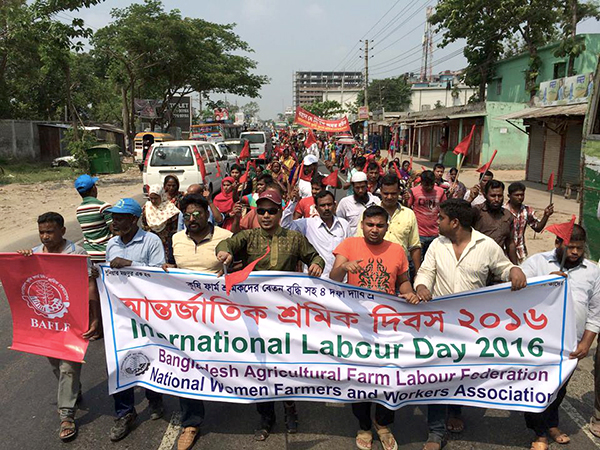Carlos Marentes
Translation: Guillermo Quintanal

Agricultural workers in New Mexico. Photo: Carlos Marentes
One of the most tragic aspects of the mode of production and consumption imposed by the corporations that control the global food system is the destruction of the rural environment, the destabilization of peasant economies and the expulsion of a huge number of people. The United Nations puts the figure at 244 million. However, aren’t migrants the political subject that in the 21st century faces the reality of the crisis? In order to answer, we visit one of the most emblematic borders.
Involuntary migration (or forced migration, as some prefer to describe it) is presented to us as the result of wars, drug trafficking, natural disasters and economic crises. All of these, together or separate, provoke the devastation of communities and the displacement of those who are able flee in the search for survival. Like the tip of an iceberg, they are just the effects of something deeper, the effects of an economic system where the appropriation of wealth through the plundering of common goods, the exploitation of humans and nature, the perversion of lifestyle and consumption perversion generates more and more profits. All of these cause involuntary migration, the tragedy of millions of people that try to escape their own countries that expel them and, at the same time, enter countries that reject them. This is capitalism’s most ominous face.
MIn the case of involuntary rural migration, its causes are often found in the loss of people’s capacity to produce food for their families and their community. Because food production and consumption are an enormous business that capital was never going to leave in the hands of the peasantry and family production. In the United States, according to their department of agriculture, agriculture and its related industries contribute more than 835,000 million dollars to the gross domestic product, and the population expends an average of more than 13% of the family budget on food. This business, as we know, is concentrated in a few hands and its main interest is the peasantry’s disappearance.
THE CASE OF MEXICO
Mexico, up to the ‘60s, was a self-sufficient country in the production of corn, the fundamental piece of the Mexican diet. However, after the Green Revolution applied by the World Bank at the beginning of the past century, and with the arrival of the “technological packages” of companies like Dow Chemical, DuPont, John Deere, International Harvester, Standard Oil and others, the peasantry progressively lost its food self-sufficiency. They stopped growing food in order to enter the logic of monoculture, growing for the market, rather than to satisfy the population’s food necessities. Naturally, this project had the complicity of the corrupt Mexican State and the ambitious national oligarchy. Long after the Mexican Revolution of the 1910s, the former generals, landowners and petit bourgeoisie’s members that survived the revolution became millionaires and prosperous businessmen. Then, some of them entered the production of narcotics for their consumption in the United States and laid the foundations for the rise of the so-called narco-state, whose violence caused the forced displacement of more than 200,000 Mexicans throughout the highest point of the so-called war against drugs.
The Green Revolution, under the false promise of modernizing and making peasant production profitable, only provoked the concentration of land in the hands of those seduced by corporations and subjected to the World Bank’s dictates, with the consequent proletarianization of the peasantry. The countryside’s modernizing avalanche swept away rural Mexico. Divested from their faculty to grow their own food, the peasantry turned into wage earners, firstly for the farms, and later for the agribusiness, due to the need for some payment to feed their families. The first step was domestic migration in the quest for survival, which then gave way to migration to Northern countries. The drama of migrants that die in Arizona’s desert is well known, as well as that of those who perish in the Mediterranean trying to reach Andalucía’s coasts.

El Paso, Texas. Photo: Carlos Marentes

Bangladesh. Photo: Carlos Marentes
WORKFORCE AT THE SERVICE OF AGRIBUSINESS
So, peasants without resources reach the North to work for agribusinesses that export their products to the South at prices so competitive, so low, that they ruin more peasant economies, which will cause the expulsion of more of the peasant population. It is within this labor relationship that the power of agri-capital rests, the cycle of economic ruin and the displacement reinforce each other constantly. Furthermore, it is within this labor relationship that the migrant collective suffers the worst human rights violations that can be found in any economic activity inside countries receiving this cheap labor.
Let’s take the example of San Quintin’s laborers, in Mexico’s Pacific region. They are thousands of migrants, mostly indigenous people from the state of Guerrero, who arrive every year to grow and harvest strawberries, zucchini, tomatoes and other products for their export to the US. It is a production worth millions of dollars based on the exploitation of men, women and children, who are submitted to labor conditions that resemble a peonage slavery system. The payment consists of around 100 pesos daily (about 4.75 euros) in exchange of 12- to 15-hour working days. The accommodation in San Quintin is subhuman. Most people preferred to live in the fields, lacking the bare minimum of health and hygiene services. As if this wasn’t enough, this export-based agriculture is characterized by an intense usage of highly toxic chemicals, which have a lethal effect mostly for women in a state of pregnancy and the child population.
And what happens in San Quintin is found in lots of places. The same happens in The Dominican Republic, Tunisia, Bangladesh, and even Canada. The US, allegedly the most economically powerful country in the world, does not fall behind. Currently, North-American corporate agriculture is the main violator of human and labor rights of rural wage earners. A production of fresh fruit and vegetables valued, according to the US’ Department of Agriculture, at 90 billion dollars whose basis is a workforce of around 4 million migrants where, according to the very federal government, 80% are Mexican and the rest Central-American or Caribbean.
South in the State of New Mexico, in the region bordering the US and Mexico, there is centred a migrant working population of 5,000 to 12,000 people (depending on the month of the year) and they only obtain an average yearly income of less than 7,000 dollars, which represents less than half the income of someone considered poor by the official poverty index. As happens in other economic sectors, the conditions suffered by women are more deplorable compared to men. They are the last to be hired and the first to be fired for any reason, their salaries are lower and their health and hygiene conditions are a disgrace, but more than that, abuses and sexual harassment continue to be the biggest problem for migrant women who work in the agricultural fields. In the case mentioned above, women represent 25% of the working people, and the lack of public policies or programs that take into account their specific needs is noticeable.
On a summer day, in July 2015, when the temperature was 108 ªF (42.2 °C), María Angélica, a mature woman who sustains a home composed of her daughter and grandchildren by herself, went to work in the agriculture fields in New Mexico at 2am and came back at 4pm, 14 hours later, with a 30-dollar payment that only corresponds to less than half the minimum wage established by the federal government. But moreover, she came back really ill from dehydration, due to the fact that, on such a hot day, her employer didn’t provide drinking water as the law stipulates. With exhaustion reflected in her wet and sleepy eyes, Angélica told me: “I feel terrible, I don’t think I can withstand work tomorrow...”.
MIGRATING TO OPEN NEW WAYS INTO THE WORLD
Human migrations are the most compulsive transnational phenomenon, and are an indicator of the old age of ancient worlds, which will either refuse to die or try to revive in more regressive forms. Faced with the capitalist globalization of destruction (...), migrants invite us to break down perceptive and reflective barriers in order deeply to understand the new language of world power that they are writing. (...) While the promoters of exclusionary globalization retreat (...), migrant routes weave a transnational, multicultural, multipolar, solidary and horizontal community, not exempt from contradictions, of course, but searching and in permanent existential practise. (...) In this sense, migrant organizations seem to visualize more clearly the need to intensify the imaginative-cultural dispute so as to push towards a horizon worthy of realising, in a political battle that mostly has to do with a wide-ranging battle of communication. It is a fight to question the denial of migration and give it new meaning from a positive, realistic and desirable perspective, creating scenarios of partnerships and confrontations with other actors in society, inseparably linked with fights for human rights. One of these scenarios has to do with the way local experiences demonstrate feasible and successful integration itineraries (...). Another scenario has to do with public space, popular resistance and the micro-media movement growing in several regions that may help us visualise migratory movements. It seems that these scenarios are preparatory steps to displace deadly trends, to accumulate strength to change regulatory frameworks and to build institutional processes towards new globalizations.
Extract from an article by François Soulard and Germà Pelayo, part of the driving group the Latin-American Letter of Migrants (Carta Latinoamericana de Migrantes)
PROTAGONISTS OF TRANSFORMATION
But women and men who generate huge earnings for agribusiness with their suffering and oppression have said “Enough!” and decided to rebel.
On March 17th 2015, the laborers from the Valley of San Quintín started a heroic fight to shake off the industrial commercial agriculture’s exploitation and claim back their rights. They have done strikes, protests and marches. Thousands of laborers have confronted not just the employers’ violence, but also the bad government’s repression that aligned with the sector. However, neither the State’s repressing force nor the corporation’s violent strength have contained their movement. A year later, although they have not achieved every demand that gave birth to the movement (working day’s reduction, healthy and safe conditions and the end of sexual harassment against women), they have achieved two main goals to strengthen their fight: the official recognition of their independent and autonomous union organization, and the national and international visibility of their fight.
In El Paso (Texas), where the Border Agricultural Workers Center (Centro de los Trabajadores Agricolas Fronterizos) is located, a fight for the defense of the rights and interests of the migrant people that work in that border area is taking place. But moreover, some kind of bi-national workers pole of solidarity has been established, surpassing unionism’s limits. And what is more, as the migrant agricultural workers’ organization is part of La Vía Campesina, there is based the movements’ task of articulating food sovereignty.
From the coffee-growing region in the South of Minas, in Brazil, to the South African vegetable fields, a signal is given to the rest of the social and popular movements. This signal places the fighting migrants in the center, against this productive system. In order to do so, the role of the victim that has been assigned to them needs to be removed, and the idea that the State and society will pity them and alleviate their suffering needs to be abandoned. Their starring potential in the truly transformational battles needs to be understood.
Migration is one way of resisting. Even though society presents involuntary migration to us like a human tragedy that needs to be answered with feelings of compassion and charity, it actually has a deeper political pillar. It is also a way of fighting against the destiny that capital has condemned them to, which involves a whole uprooted class, even though the actors do not have full consciousness of the meaning of their action. It is resisting and fighting so as not to disappear as a people, as indigenous people, as peasants, as women and as youth.
So, this brutal and unfair system, by provoking migration has created a critical subject for the battles in which we find ourselves, so as to direct our efforts towards a different system. It is the subject that we must bring to the center of our movement in order to confront the system more strongly and move forward in the construction of our alternative of food sovereignty.

THE CENTRAL ROLE OF WOMEN
Because the greed of agricultural capital has become particularly unbearable for migrant women, they have taken on a key role in this outbreak of rebelliousness. They are the ones leading many of the movements, like in Tunisia, where the Million Rural Peasant Women organizes the female workers of agricultural farms to improve their working conditions. This was how, in the spring of 2015, they conducted strikes at the Gomrien agricultural farm, in Teboruba (30 kilometers away from the city of Tunis) and, even though their main demands weren’t met, they did achieve important outcomes from their fight. The main one is that, for the first time, the sector agreed to listen to their demands and negotiate with them.

Agricultural workers on strike, Gomrein. Foto: Carlos Marentes